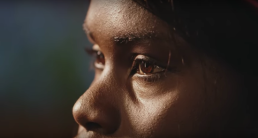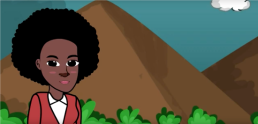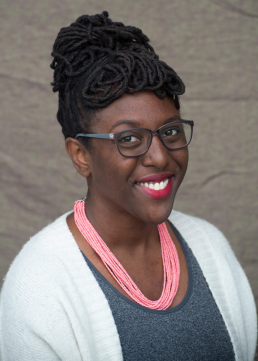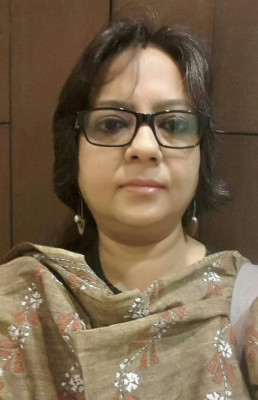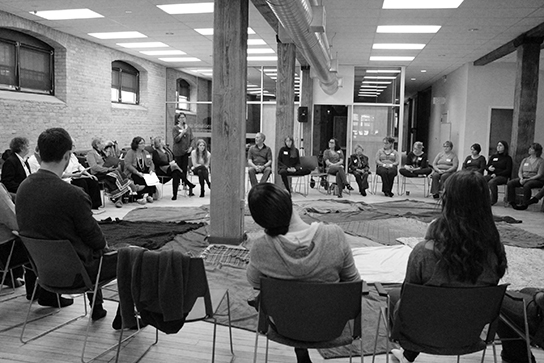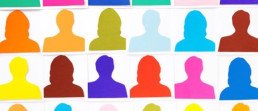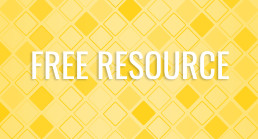WHO AM I
April 6, 2020Dismantle Racism,The Big Picture,Blog
Adhel Arop is a two time award winning filmmaker from Vancouver, Canada. She has been a poet since the age of eight, writing poems for conferences and school assemblies. She has always gravitated to poetry as a way to express and explore emotions.
Adhel’s documentary “Who am I?” weaves together her experience settling into Canada as a refugee with her family and her mother’s experience as a child soldier in South Sudan. We are excited to share two of Adhel’s poems, Sudan’s Echo and SPLA Song and a short interview with the artist about her influences and hope for her work.
PART I.
(This is the translated song that my mother and I sing at the end of the documentary.)
Sudan’s Echo
By: Adhel Arop
The sky weeps
my country screams
I watch in agony
the eyes of the people I love dearly tell stories of sadness
they are children
who have become broken adults
Now their children inherit that hurt
trauma becomes Sudan’s
greatest
Legacy
I remember the music that played in the background of my childhood
my mother seeking solace in the things that destroyed her
I would look into her eyes
Seeing the reflection of the skies
she once looks up to
her face
crying out as muffled voices screeches from the radio
eyes fading into an expression I could not understand.
We were strangers
she was strength
yet in her power I saw weakness
every day
I heard these muffled voices
Hopeful screams
they were my mother’s sense of home
she gave up her childhood for her country
within that exchange
her eyes stopped forming tears
while her soul drowned in agony
What has become of the person she wished to be?
I remember hearing the muffled voice of men
seeping out of the radio
the sounds lingered in the air
longer then the silent stares we exchange
I would whisper
“are you ok?”
She looked at me
our hearts exchanged words our mouths could not
never understood why these cassettes meant so much to her
How was I to know she had been a child soldier
These muffled voices of men screaming
were the songs that once kept her alive
at a time she wasn’t sure if she wanted live
I weep for her
because I know
she has lost her ability to shed tears for
herself….
SPLA War Song
South Sudan wo yay
SPLA wo yay
Karyom wo yay
Madeer dan wa
Leaders of Wau
Madeer Wau (region in Sudan)
Leaders of Wau
Meedeer dan Wau
Leaders of Wau
Ran Wau
People of Wau
Madder dan Malakal wandeed ku juba
Leaders of Malakal l And Juba
Loy by ka de ken pel a by
What are we doing to our country
bogou thiem chin te de e ya chol
You’ve left our country in shambles and have nowhere to call home
Maye maye maye
My god, My god
Maye maye maye
My god, My god
Meerder yat kwon acha keg pwol
You’ve homes, your province
Ke dom ke lwoy che by la tweng
and taken on jobs that wont help the country develop
E ke reg a de
What a terrible thing
Wed kwan Sudan
Children of Sudan
Howne a thiow thar a che la mang
That sounds of gunfire is going
Keg jej a Nemir
off as the soldier fight against us
Sonke sonke A mane a Nemir jol ke moge a choge
Nemir will hate it but we will take our country back
Bunge Kwan yin kej waii kuwa teng
Governor Haven’t you seen us we are dying
pinge by Sudan a riag bange da
Our Country is in shambles
pinge bwog liew
We can’t move forward
kowo che jur Maraleen Jok Kwa nhin win a Bol
we can’t take back our country when most of us have died
The arabs have chased us out
Kwa Nhin son of Bol
Name of Leader
Maye maye
my God, My Gd
Leke John Karang Leke John Karang bwog loy ke de Na ye piang da
Tell John Karang how will we take back our land,
Bunge Kwa nin kej wei kwa teng binge by Sudan a riag bange da
Governor Kwanin haven’t you seen us, haven’t you seen our country we are dying
pinge bwog liew kowo che jur
How will we take back our country when many of us have been killed by soldiers
Maraleen Jok Kwa nhin win a Bol
Tell us
Maya maya maye
My God, My god
Leke John Karang bwog loy ke de Na ye piang da
Tell John Garang what will we do to get back our land?
Nhwen a thow bwog rod nyia wei
When it comes our land We will die for it
Ghwen a thow wed kwan e two
You will only take our country over our dead bodies
Gwen a thow wed kwan Janub
We choose death, our life is our country
Biange john garang ina choge mouthe mathu biange da
John Ganag we salute you,
Ka pae ka dianhg owa nug neen jwij
its been 3 month we’ve been walk and we are tired
PART II.
Interview
Sadia Hassan: Adhel, I just watched your moving documentary. It is so full of love for your mother and you all’s shared language and common history. I grew up in Clarkston, GA where my family and I were resettled as refugees in the mid 90’s. I had lots of friends from Sudan and Gambia. Your documentary reminded me so much of what it was like (and honestly, still like) to grow in that middling place of multiple identities.
What of your work in the world inspired these poems?
Adhel Arop: My documentary “Who Am I” is the film to my poetry, I wrote these poems while creating my first film, I used them to hire collaborators, the set the tone for all my present work, I learned to translate Dinka (my native tongue) I got a deeper for my language, opening me up to a whole new world of stories, the history of my country South Sudan and my mother and aunts apart of the liberation movement, this feminine power in the face of war gave me courage to explore my mothers trauma.
SH: What do you hope readers will walk away with?
AA: I hope they hear the hope that echoes through time, the songs that my mother sang as a child soldier are now interweaved into my artistic platform raising my success as a filmmaker while honouring my roots. These types of stories are not unique. War and displacement have affected many countries and their development is intergenerational trauma something we all can connect to one way or another.
SH: In the age of climate change, what do you feel the world owes Sudan?
AA: I wont say the world owes Sudan anything, war owes Sudan peace. Centuries of fighting with the division between the majority Islamic North and a Christian South, one that led to two civil wars, leading to a referendum in 2009; these issues birthed a new nation called South Sudan, the newest country to join the UN, A country that has been plagued by civil war and continues the unrest after the referendum. These two nations, Sudan and South Sudan, are going to be heavily affected by the climate change.
The South is still on a first wave of industrial revolutions. I hope the world will aid Sudan and South Sudan in exploring solar energy for infrastructure building. As a human rights activist, I believe that at-risk countries need our support. They are behind on technology because of on-going war and with climate change and their effects will take have some concerning repercussions for at risk countries and Sub-Saharan Africa, the world should aid Sudan & South Sudan on their Sustainable Development Goals and infrastructure building through the use sustainable options such as Solar Energy, I hope the countries will be offered a voice and connected in the fight for Climate change as leaders.
SH: Can you tell us a little about a community practice you have that has inspired your art-making?
AA: I have been a volunteer mediation instructor on the downtown eastside, Karma teachers is a non-profit studio and teacher training school. Volunteering for the past eight months has provided an inside look at what goes into running a yoga studio the community that gathers. We all volunteer our time and help one another, It’s inspired my art to be involved in a community, my art has grown significantly through the developing love of all the communities I’ve been a part of. My art is to raise people’s voices that were once silenced through multiple digital mediums.
SH: What was your experience translating Dinka with your mom and what do you think the world of translation can do for us in terms of empathy and connecting with each other?
AA: Translating was definitely difficult when I originally took on the task, I translated over 40,000 words from Dinka to English. I would call my mom and ask her to re-pronounce certain words or songs. Dinka has several accents and I spoke/understood one certain accent, but after hours and hours of listening to different people speaking the language, I managed to have an easier time. I think that understanding breeds empathy and connection because it allows us the ability to understand each other. Learning Dinka more intensely has made me feel more connected to my mother. It gave us something to do together. People from my community have really been happy with my interest in exploring the culture and language, providing me with opportunities within the community to learn to speak and translate the language.
SH: Sudan’s Echo is entirely in English while SPLA Song almost feels like a call and response between English and Dinka. What feelings were you trying to evoke with each poem? Are they in conversation with each other?
AA: In Sudan’s Echo the scene is set in my childhood, on any given day you would find my mother cooking and drifting off to the sounds that poured out of the radio I wasn’t aware at the time but the songs she listened to were songs from her time in the SPLA. This particular song is actually my mother’s favorite song so I decided to use it for the foundation of work pertaining to the SPLA and child soldiers. My mother and her friends from the war spend hours on the phone singing to one another in conferences even until the current day, it always sounded like muffled voices until I could understand the language in more detail as an adult. So creating this piece of poetry alongside translated war songs are my attempt to provide what it feels like to have a traumatized mother with a secret past, you always knew there was something off but it took years to uncover the mystery. It has given me so much healing to explore these stories of my past, finding creative ways to translate my experience has been the most exciting part for me. These two pieces of work are in conversation because the SPLA Song when performed join together, I sing the songs and recite the poetry when I have speaking engagements I will perform the works together.
DEEPER THAN HAIR DISCRIMINATION: A MOVEMENT TO ADDRESS AND DISMANTLE SYSTEMIC RACISM
March 25, 2020Equity,Dismantle Racism,Education,Blog
When I graduated from Columbia University, I was informed in a professional development workshop at a national conference that my hair should not distract from my excellent credentials. I did not understand how hair that grew naturally out of my scalp could be labelled as a source of barriers. The styles that were mentioned as socially acceptable for professional upward mobility were straight hairstyles that did not reflect the texture of my natural hair.
As co-founder of the CROWN Campaign, a movement founded to end discrimination and injustice of all forms including hair discrimination. I have had lived experiences of hair discrimination which fueled my passion to address systems transformation through a lens that is informed by my interdisciplinary background. CROWN campaign is an interdisciplinary team and growing village of grassroots advocates in academia, business, policy, journalism, research, health, law, the arts, and community who have lived experiences of hair discrimination, know of those impacted by hair discrimination, and have been engaging voices from around the country and globe on experiences with hair discrimination. The CROWN campaign is a labor of love.
1. A few things to know about the CROWN Campaign
The CROWN Campaign was founded to end discrimination and injustice including hair discrimination locally and globally and we do this using a “it takes a village approach”. The CROWN campaign village has shared expertise in research, law, creative arts, journalism, business, virtual and in-person activism and many other areas.
2. My Hair, My Crown, My Freedom
I have recently written and directed a short animation film, entitled “My Hair, My Crown, My Freedom” and brief discussion guide to engage local and global populations on what a diverse, equitable and inclusive world can look like.
The short animation film can be found HERE
3. Journey of the CROWN Campaign
The journey for the CROWN campaign began in February 2019, when the New York City mandate against hair discrimination was announced. I was sitting on the couch as I read the news about the hair ban. Reading the New York City hair ban validated and emboldened my voice and experiences in terms of the discrimination that I faced and I reached out to individuals in my network through a mass chain of emails about tackling this issue from an interdisciplinary lens including reaching out to Shemekka Ebony who would become a co-founder in this movement. It started with many emails. In the initial stages, there were some who said “it is just hair” and the black community has more pressing issues to address in terms of systemic racism.
Those of us who have had lived experiences knew that it is deeper than just hair in terms of impacting educational attainment, employment opportunities, upward mobility, health and well-being. This further emoboldened me to share my experiences and reach out in my networks to get an interdisciplinary team together to provide evidence on the harmful impacts of hair discrimination from a big picture lens as being much deeper than hair.
The individuals I initially engaged then referred other individuals who came to form the core crown campaign team and subsequently the growing village who have contributed their expertise. For example, Shemekka Ebony, co-founder, has been instrumental in developing the network of activist through social media advocacy. Dr. Manka Nkimbeng joined the team bringing in the research lens of the health impacts of discrimination from her dissertation research. Both Shemekka Ebony and I mentored Dr. Manka Nkimbeng as part of the Robert Wood Johnson Health Policy Research Program where she expressed an interest in crown campaign’s efforts and wanted to focus her enhanced learning project on the health impacts of hair discrimination. Crystal M Richardson and JB Afoh Manin have focused on the legal and policy angles with JB’s focus being on men and hair discrimination.
4. It’s Deeper than Hair – Black Hair History and perpetuation of systemic racism today
The CROWN Campaign will be launching a global series called deeper than hair to further contextualize the health, economic, social justice, and well being impacts of discrimination. In the black community, hair and hairstyles have strong historical, political, cultural, social, and familial significance in terms of identity. Such hairstyles include afros, braids, bantu knots, locs, African thread styles, twists, fades, and leaving hair in various forms of its natural state.
Unfortunately, individuals have been discriminated against on the basis of the expression of this cultural identity and practice of natural hair/hairstyles. This has resulted in a number of inequities in activities of daily living such as lack of employment opportunities, discrimination in the workplace, discrimination in school settings, job loss, microaggressions and much more. In a number of case studies, individuals have been told to conform to the dominant culture for assimilation and upward mobility further promoting racist stereotypes. There is strong research evidence on the adverse effects of different forms of discrimination on health, social determinants of health, and equity.
Understanding the historical context of black hair helps us to understand how systemic racism has been propagated in policies. Dr. Patricia O’Brien Richardson, one of the CROWN Campaign collaborators in academia provides an in-depth historical context based on her research as follows: “Black people have a rich history with hair beginning in Africa. In the earliest African civilizations, hair was considered a cultural marker and used to indicate age, marital status, wealth, rank, and tribal affiliation. In American society, hair has historically been used as a tool of systemic violence against black men and women who have been socially penalized and stigmatized for their hair. During colonial period and later in the Jim Crow era came to be described as wild, unkempt, messy, sweaty, knotty, dirty, and nappy. Wild, messy hair was often equated with wild behavior, signifying insanity.”
We see similar words, “unkempt” “wild” “messy” “nappy” “unprofessional” perpetuating structuralized and systemic racism in workplace and school grooming policies today.
5. Impact of the CROWN Campaign
Since the vision and inception of CROWN Campaign in February 2019, CROWN Campaign has provided advocacy and presentations around the country, and has a growing list of partners in advocacy, including partnering with Dr. Patricia O’Brien Richardson who envisioned the first ever historic inaugural CROWN Conference in New Jersey. An attendee at this conference, Karla Arroyo, a journalism student, has become our first inaugural CROWN Campaign fellow. She will be completing her capstone as part of the fellowship with a focus on community organizing and uplifting the stories and voices of those impacted. I, along with the CROWN campaign team and crown campaign village, will be mentoring her from an interdisciplinary framework of co-design.
Due to a request from policy makers for research on hair discrimination, CROWN campaign has created a readily accessible starter library in the resource section for evidenced based research on the impacts of hair discrimination because we recognize that it is deeper than hair. We all have lived experiences and have interacted with individuals and communities who have been severely impacted from hair discrimination in terms physically, socially, mentally.
The CROWN campaign team and village contributes expertise in the creative arts including photography, film, scholarly research, journalism, written and spoken word, in person advocacy and educational outreach, as well as social media advocacy. CROWN campaign has developed tools and resources and also curated tools and resources from the growing village that can be found here. In the village, we want everyone to feel empowered to lift their voice and expertise in various forms to dismantle racism. We have seen this manifest beautifully in the village through research, advocacy, poetry, film photography, legal, policy and many other areas. The tools and resources can be found HERE.
6. CROWN Campaign Advocacy Case
CROWN Campaign has been in advocacy for cases of discrimination including most recently two young boys who were deprived of an education within the Tatum Independent School District for natural hair. CROWN Campaign provided expert witness testimony and an advocacy letter.
It truly takes a village to dismantle racism and CROWN campaign with the help of the growing village is taking an interdisciplinary approach to tackle and dismantle racism using a multi-prong approach.
The CROWN Campaign is a team of volunteer advocates that are self-funding this important work across the United States and beyond. We cannot do it alone. We need your help!We are a growing Interdisciplinary collective of community members, professionals, and experts with lived experience that are championing the advocacy and education of the impacts of hair discrimination to natural hair citizens. We need support funding the travels, events, expenses, and labors of love from our team. Donations from those that believe in this work and can identify with the need for change, please donate and share. http://www.crowncampaign.com/donate.html
Learn more about the CROWN Campaign at www.crowncampaign.com
FB IG & Twitter @crowncampaign
Dr. Bernice B. Rumala is Co-Founder for the CROWN Campaign , an effort aimed at ending discrimination and injustice locally and globally, including hair discrimination. With more than 15 years of experience, Dr. Rumala earned a PhD and three masters degrees from Columbia University and served as a Fogarty-Fulbright and Harvard Fellow. She has contributed her interdisciplinary expertise as a change agent in the public, private, academic and international sectors. As a former senior consultant for the United Nations, her areas of interest and expertise include equity, health equity, social justice, diversity, inclusion, discrimination, interdisciplinary-programming, advocacy, community engagement, and systems transformation.
Dr. Rumala has lived experience of the ongoing challenges of severe inequities and the detrimental impacts to individuals and communities, specifically vulnerable communities and communities of color. This is unacceptable to her and should not be the norm. Dr. Rumala also considers herself a global citizen based on international experiences in more than thirty countries. She has had global experiences in stable regions as well as regions impacted by war, conflict, and instability, including Iraq where she worked for the United Nations. She continues to contribute her expertise as a global and local leader, consultant, and, is the Founding CEO of the Change Agent Firm.
Bianca Campbell
Bianca Campbell (they/she) is the Movement Building Senior Manager at Forward Together. She has worked in reproductive justice work since 2011 with organizations like SPARK Reproductive Justice Now! and the National Network of Abortion Funds. She has also been a doula for births, abortions and personal transformations. Now, she is a weaver of the Strong Families Network, centered on family recognition and definition through a cultural strategy. She also shares her commitment to holistic mind and body wellness through her coaching via Spektra Wellness.
bianca@forwardtogether.org
Sahana Chattopadhyay
Sahana Chattopadhyay is a global Speaker, Writer, Master Facilitator, Organization Development Consultant, and Coach. She works at the intersection of Complexity, Human Potential, Organizational Transformation, Systems Thinking, and Emergence. Her passion is to enable organizations to develop the capacities, skills, and mindsets to become “thrivable” in the face of uncertainty and ambiguity.
The core of her work has been to build a culture of transformative learning and collaboration in distributed and fluid organizations across diverse global cultures. At present, she synthesizes her experiences to help build capacities for Regenerative Leadership, design spaces for Emergent Learning, and communities for Generative Conversations through Facilitated Dialogues, Workshops, Master Classes, Consulting, and Coaching.
Ben Roberts
I am a systemic change agent and a process artist. Since March 2009, when I began leading a local weekly “Discussion Salon,” I have been convening and hosting both in-person and virtual conversations on a regular basis, in service to initiatives for change.
I specialize in making virtual events come alive, either as stand-alone engagements or in conjunction with in-person gatherings. I have extensive experience adapting large group conversational processes such as World Cafe, Open Space Technology and Appreciative Inquiry to the virtual realm, as well as integrating in-person and virtual formats within a single conversation, gathering or engagement. I use these processes to support collaboration, build communities of practice and purpose, and to host large scale conversations in service to the work being done across multiple dimensions of global systemic transformation.
A PATH OF LEARNING, RECOGNIZING AND HONOURING TRUTH AND RECONCILIATION
February 17, 2020Dismantle Racism,Blog,Equity
It was the release of the Truth & Reconciliation Commission reports that nudged our organization to read, reflect and better understand how we could both as an organization and network learn our country’s history and advance truth and reconciliation. We had been intentional about recruiting someone to serve on our board of directors from the Indigenous community as we came to realize that our board’s diversity program didn’t take the Indigenous community, the first peoples of this land, into account. We had started to incorporate a land acknowledgement at the outset of our workshops and events; however, we stumbled and didn’t get things quite right and required some education and guidance.
As an organization we are on a journey to listen deeply, engage and be in true dialogue. Because we are uneasy as a sector about misstepping there can be a chill in engaging with truth and reconciliation. We need to create courageous spaces as there is an urgency to this issue and ask ourselves what are we doing each day towards reconciliation. We need to learn from a place of understanding and not place ourselves as hero or saviour. There is an immense amount of work as settlers, immigrants and as a community as a whole that we need to do related to truth and reconciliation and we cannot expect Indigenous people to continually provide emotional labour by educating us, or holding us and our healing.
LEARNING
It starts with learning and understanding the full history, stories and our shared responsibility as settlers. We need to acknowledge the harm and understand the intergenerational trauma and impact of residential schools, the Sixties Scoop and other atrocities towards Indigenous peoples by both settlers and the government.
Many of Pillar’s staff have participated in the Indigneous Cultural Safety program from Southwest Ontario Aboriginal Health Access Centre, an interactive and facilitated online training program that addresses the need for increased Indigenous cultural safety within the system by bringing to light the service provider bias and the legacies of colonization that continue to negatively affect service accessibility and health outcomes for Indigenous people.
Further, our staff team have participated in programs and learning opportunities that have included an Indigenous learning arc including Banff Centre’s Social Innovation Residency and Foundations of Purpose Program; Social Capital Partners (SOCAP18); Ontario Nonprofit Network’s Nonprofit Driven Conference; Imagine Canada Sector Champion Roundtable; Resilient Cities Conference; London Environmental Network’s River Talk Conference and EconoUS.
For our network, board and staff we participated in and held sessions of the KAIROS Blanket Exercise. The exercise is an interactive learning experience that teaches the Indigenous rights history, increases our awareness of Canadian history as it pertains to Indigenous peoples’, promotes empathy, and inspires action towards reconciliation. We first hosted it as a public session at Innovation Works, a shared space for social innovation, and it sold out. Since it evoked much emotion and reflection, we decided to continue running the sessions. The second time we hosted it at an Indigenous based partner Atlohsa Family Healing Services, and this was an example of how connecting and going to an Indigenous organization was a more impactful experience.
Furthermore, we have been hosting decolonization workshops, Indigenous sharing circles and a local Indigenous learning series for the nonprofit sector so that other community members can explore Canada’s shared history, stories and work towards solutions on decolonization to build stronger, more positive relations with Indigenous people.
RECOGNIZING AND HONOURING
Nokee Kwe’s +Positive Voice program supporting urban Indigenous women in creating positive narratives and community connections was the recipient of the 2017 Community Innovation Award for the Pillar Community Innovation Awards. Former Program Coordinator, Summer Thorp remarked, “The wonderful thing about being nominated and receiving the award is the sense of ownership that the Indigenous women in our program feel; this truly is their award. Having their bravery, resilience, and accomplishments recognized by the community on such a large scale is a validating experience that they proudly share when talking about their achievements.”
Like many organizations, Pillar adopted the practice of sharing a land acknowledgement before workshops and events. By making a land acknowledgement you are taking part in an act of reconciliation, honouring the land and Indigenous presence. We started with a fairly brief version and stumbled over the pronunciation. We had an Indigenous colleague come and provide some training in the pronunciation.
ALL CANADIANS MUST NOW DEMONSTRATE THE SAME LEVEL OF COURAGE AND DETERMINATION, AS WE COMMIT TO AN ONGOING PROCESS OF RECONCILIATION. BY ESTABLISHING A NEW AND RESPECTFUL RELATIONSHIP BETWEEN ABORIGINAL AND NON-ABORIGINAL CANADIANS, WE WILL RESTORE WHAT MUST BE RESTORED, REPAIR WHAT MUST BE REPAIRED, AND RETURN WHAT MUST BE RETURNED.The Truth and Reconciliation Commission of Canada
Over time we were hearing that land acknowledgments were feeling like a check box and they should be customized and aligned with the intent of the event and we started to personalize each one to the person who was delivering it and the event we were hosting. Still this did not feel right and we met with various Indigeneous colleagues to seek their guidance. Today, we have an elder open with a welcoming or prayer and then we have a settler do the land acknowledgement and share their role in truth and reconciliation. A welcome and land acknowledgement is only a start and organizations need to understand there is much more we can action together.
Pillar encourages and supports those who wish to participate in smudging ceremonies. Smudging is the burning of sacred medicines and is meant to purify, protect, ground and harmonize people and spiritual spaces and is a common practice among Indigenous people. We have had concerns related to allergies and location in our space and therefore we created a smudging policy that states that it is a welcome practice at Innovation Works and it includes notifying our co-tenants of timing and location. Pillar recognizes the spiritual and cultural importance of Indigenous practices, and is committed to creating an inclusive environment for its co-tenants and the wider community.
PARTNERING AND SUPPORTING
Through our social enterprise and nonprofit supports we have worked alongside Yotuni that provides mentoring, guidance, cultural education teachings, workshops and healing circles to provide the tools and life skills for Indigenous children and youth to live positive and healthier lives. Further, Kuwahs^nahawi is a social enterprise that provides consulting, educating and facilitating using Indigenous practices, specializing in teaching truth of Indigenous People and history, and ways we can work together towards healing and reconciliation that Pillar has engaged for several sharing circles and workshops. We have also supported Atlohsa Gifts that sells authentic products from Indigenous artisans throughout Canada to help fund the services of Atlohsa Family Healing Services. We have offered incubation, business planning and market connections. Further, Pillar as part of its social procurement sources the services of these two social enterprises for consulting, workshops and gifts for our speakers and staff.
When developing new partnerships, it is essential to engage Indigenous-led organizations as partners in the development of the project. When we were seeking interest in having Indigenous leaders on nonprofit boards we were reminded that we had made an assumption that they would want to sit on boards. A group of Indigenous leaders have been coming together to explore about what leadership means to them and how that dovetails with nonprofit governance. It had surfaced questions about how nonprofit boards are colonized and whether they are inclusive. Most recently, we have built a partnership at the outset of a new program with Centre for Social Innovation and Nordik Institute for a new provincial program, Women of Ontario Social Enterprise Network funded by the Government of Canada through the Federal Economic Development Agency for Southern Ontario. This new program is focused on supporting women social entrepreneurs and is based on inclusive design and Indigenous approaches to venture creation.
Through learning, recognizing and honouring our history, Indigenous people and their traditions we are witness to the resilience, courage and determination they have and continue to demonstrate daily.
IDEAS FOR INCORPORATING WORK WITH THE INDIGENOUS COMMUNITY INTO YOUR ORGANIZATION
- Learn and acknowledge history – Learn the history and acknowledge the harm and atrocities in our shared Canadian history including reading the Truth & Reconciliation reports
- Recognize the urgency – There is an urgency to Truth & Reconciliation because hard and atrocities are still happening today
- Make incremental progress – Ask yourself how you can make progress towards reconciliation each day in your organization
- Follow not lead – Go to Indigenous related organizations, events and training rather than asking Indigenous people to come to you on boards, committees and events
- Recognize power dynamics – Acknowledge power in all interactions and be prepared to give up power
- Build relationships and trust – This is a critical step before jumping to requesting a partnership
- Consider how to redistribute wealth – Look at strategies such as a granting and investments and have the Indigenous community as a priority and focus
- Have the right partners – Pause and ask who is missing in the room and be intentional
- Create a social procurement policy – Consider purchasing from Indigenous-based social enterprises and business
- Go beyond land acknowledgements – If doing them have a welcome from an Indigenous elder and land acknowledgement by a settler to make it meaningful
- Explore Indigenous cultural traditions – Learn about the 7 Sacred Teachings and other Indigenous cultural traditions including the medicine wheel and smudging from a place of learning without appropriating
- Create courageous, safe and open spaces – Make sure your organization and community is inclusive of Indigenous people and all people
Originally published at The Network Approach by Pillar Nonprofit Network
“The Network Approach by Pillar Nonprofit Network shares our evolution as a place-based and impact-focused network as well as our promising practices using the network building principles that have guided us since our inception. Each piece of content on this site showcases a part of our journey towards becoming a thriving network organization, even our logo helps to tell the story as radiant nodes shine outward to represent an expanding network.”
Amy C Moritz
My most satisfying consulting moments happen when I am facilitating a group of people to bring a vision of social change to reality. Every engagement is unique because every group is driven by their specific passion for equity and social justice.
Every group has a distinct set of skills and resources from which to innovate for their unique community. I am grateful for those who do not let the complexity of the social challenges that confront us limit what they believe is possible.
Stipend for Posts by People of Color
February 4, 2020Transformation,The Big Picture,Blog
We are offering a stipend of $250 for any relevant blog post or resource submitted by a Person of Color to help support hearing all voices on our blog. You can submit up to 4 blog posts or resources during the year.
Simply write a blog post of around 250-750 words (1 to 3 pages) about anything that can advance our network strategies. We are especially looking for articles on how people are or could be collaborating to dismantle racism, but all topics will be considered.
If you have any processes, worksheets, handouts that you have used successfully, please consider submitting them as well! If you want to charge for them, let us know as we want to experiment with having payment paid directly into your PayPal account.
Here is the process:
- Send your draft or paragraph of your topic to June for approval at: info@dev.networkweaver.com. [ap_spacing spacing_height="10px"]
- If approved, submit your blog post or resource as a google doc, or if you don’t use google docs, a word doc. [ap_spacing spacing_height="10px"]
- Include a mailing address for your check to be sent to, a photo of yourself and a 1-3 sentence bio which will appear in the post or resource.[ap_spacing spacing_height="10px"]
- As soon as it is approved you will receive the check, although it may take a few weeks for the blog or resource to be posted.[ap_spacing spacing_height="10px"]
We look forward to receiving your submission!
Featured image found at hbr.org
Ripple Effect Mapping
January 27, 2020Network mapping,Blog
Because networks often engage many people, some of whom are only occasionally involved, it is harder to track the impact of the network. One solution to this might be the use of a technique called Ripple Effect Mapping.
Historically this process was done during a face-to-face session but I believe it could also be done virtually using a mural.co whiteboard and virtual PostIt notes.
The first step is to identify the scope of the mapping. Are you identifying impact of all of your network’s activities or only a specific initiative such as an Innovation Fund?
The next step is to gather information. This is generally done at a convening, though that convening could be a zoom.us session. People are put into twosies (if virtually, they are moved into breakout rooms of two people). The twosies are given a framing question or questions:
- How has (this activity, this network) made a difference in your work, your community or yourself?
- Have you seen unexpected results?
Each person in the dyad interviews the other and records the answers.
The group reconvenes in a large group. Each person then shares their story (with the partner adding details as needed).
Then there is a second go around where people answer the questions:
- What happened as a result? And, what difference did it make?
- Did you see this type of activity spread throughout your community, to other communities, to other networks?
- Was it modified in any way?
The answers to these questions can be added as additional ripples.
Here is an example of a map:
Once the map is completed, the group is encouraged to notice all the impacts and celebrate! The map can then be converted into lists of impacts to be shared with funders or the public.
Several resources that I found helpful in learning about ripple mapping are:
If you use this process, please share the results with us in the comments section below.
Featured image by Joe Vickers
Blueprints for Change Progressive Organizing and Campaigning Manual
January 3, 2020Network Leadership,Network Weaving,Blog
[ap_spacing spacing_height="15px"]
The Blueprints for Change Progressive Organizing and Campaigning Manual is a compilation of all guides produced through Blueprints for Change up till November 2019 in its current edition. This PDF doc, which is full of internal links for easy navigation, also contains information on the project, its policies, values and a full list of all contributors.
Blueprints for Change is very happy to offer this bundle of hard work and collective wisdom to progressive organizers and campaigners everywhere! This Manual represents two years’ worth of work and the contributions of over 100 campaign innovators and groups.
What you’ll find within:
- 14 detailed how-to guides on cutting-edge approaches to progressive organizing and mobilizing
- totaling over 180 pages
- field experiences and insights of over 100 progressive campaign innovators from across the world!
CLICK HERE to download the manual.
[ap_spacing spacing_height="15px"]
